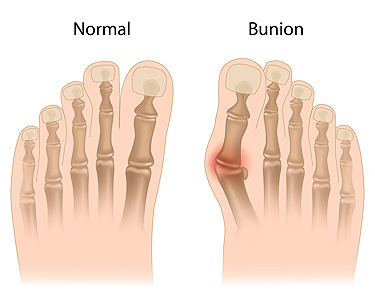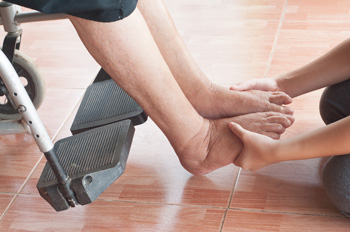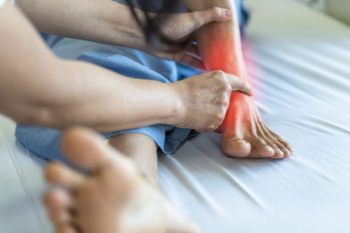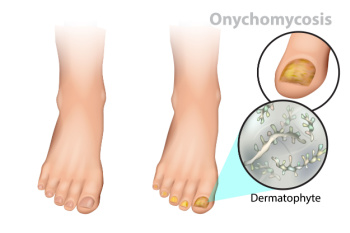1648 US Highway 130
North Brunswick, NJ 08902

Bunions are a foot deformity characterized by a noticeable bump at the base of the big toe, where it angles towards the second toe. This deformity results from an imbalance in the bones and ligaments of the foot. Symptomscan typically include localized pain, swelling, and redness at the site of the bunion. The affected toe may also become stiff, making it difficult to wear shoes comfortably or walk without discomfort. Several factors contribute to the development of bunions. Genetics play a significant role. If bunions run in your family, you are more likely to develop them. Wearing tight, narrow shoes can worsen the condition by putting pressure on the toes. Other contributing factors can include arthritis and structural abnormalities in the foot. If you are experiencing some of these symptoms, it is suggested that you schedule an appointment with a podiatrist who can diagnose and offer a comprehensive treatment plan.
If you are suffering from bunion pain, contact Dr. Robert Fink of Brunswick Foot & Ankle Group. Our doctor can provide the care you need to keep you pain-free and on your feet.
What Is a Bunion?
Bunions are painful bony bumps that usually develop on the inside of the foot at the joint of the big toe. As the deformity increases over time, it may become painful to walk and wear shoes. Women are more likely to exacerbate existing bunions since they often wear tight, narrow shoes that shift their toes together. Bunion pain can be relieved by wearing wider shoes with enough room for the toes.
Causes
Symptoms
In order to diagnose your bunion, your podiatrist may ask about your medical history, symptoms, and general health. Your doctor might also order an x-ray to take a closer look at your feet. Nonsurgical treatment options include orthotics, padding, icing, changes in footwear, and medication. If nonsurgical treatments don’t alleviate your bunion pain, surgery may be necessary.
If you have any questions, please feel free to contact our office located in North Brunswick, NJ . We offer the newest diagnostic and treatment technologies for all your foot care needs.

Foot issues in older adults are often linked to frailty and decreased motor performance, significantly impacting their quality of life. Common problems include arthritis, bunions, calluses, and reduced foot flexibility, leading to pain and difficulty walking. These issues can increase the fear of falling, contributing to reduced mobility and independence. A podiatrist can perform a gait analysis and balance assessment to identify specific problems. Customized orthotics, proper footwear recommendations, and targeted exercises can improve stability and alleviate pain. If you are elderly or taking care of an older person, it is suggested that you schedule regular podiatric visits to help maintain foot health, enhance mobility, and reduce the risk of falls.
If you need your feet checked, contact Dr. Robert Fink of Brunswick Foot & Ankle Group. Our doctor will attend to all of your foot and ankle needs and provide you with quality treatment.
Geriatrics and Podiatry
When people age, some common issues that may occur are bone density loss, dry skin, poor circulation, and rough brittle nails. These issues may also affect your foot health if the necessary steps are not taken to alleviate the problems.
It is important to take care of your feet because feet that are injured or diseased can affect your overall health. Having painful feet hinders your ability to do daily activities or may decrease your willingness to do the things that you need to do.
Visiting Your Geriatrician
As we age, health problems become more likely, so it is essential to visit your doctor for check-ups to ensure that you are doing the best you can to take care of your health. It is recommended to check your feet frequently for any possible cuts, bruises, swelling, corns or any other irregularities.
Taking Care of Elderly Feet
Cracked or dry feet can be treated by applying moisturizer often. It is also important not to wear old socks because the older the sock is, the higher the possibility there will be that there is bacteria there. Wear fresh socks and make sure they fit properly.
Proper foot health means that you can have a more active lifestyle and you will not be bogged down by pain. Foot health also leads to good circulation, which is paramount for overall health.
If you have any questions, please feel free to contact our office located in North Brunswick, NJ . We offer the newest diagnostic tools and technology to treat your foot and ankle needs.

Tarsal tunnel syndrome occurs when the posterior tibial nerve is compressed within the tarsal tunnel, leading to a range of symptoms. Individuals with this condition often experience pain, tingling, or numbness in the foot or ankle, particularly along the inner side. Symptoms may worsen with prolonged standing or walking. Diagnosing tarsal tunnel syndrome involves a thorough physical examination, where a podiatrist may assess nerve function and look for signs of compression. Diagnostic tests such as nerve conduction studies or an MRI scan may be used to confirm the diagnosis. Conservative treatments such as rest and anti-inflammatory medications may offer relief. Wearing supportive footwear and using orthotics may help to alleviate pressure on the nerve. If you have pain in the inside of your foot, it is suggested that you consult a podiatrist who can accurately diagnose and treat tarsal tunnel syndrome.
Tarsal tunnel syndrome can be very uncomfortable to live with. If you are experiencing tarsal tunnel syndrome, contact Dr. Robert Fink of Brunswick Foot & Ankle Group. Our doctor can provide the care you need to keep you pain-free and on your feet.
Tarsal Tunnel Syndrome
Tarsal tunnel syndrome, which can also be called tibial nerve dysfunction, is an uncommon condition of misfiring peripheral nerves in the foot. The tibial nerve is the peripheral nerve in the leg responsible for sensation and movement of the foot and calf muscles. In tarsal tunnel syndrome, the tibial nerve is damaged, causing problems with movement and feeling in the foot of the affected leg.
Common Cause of Tarsal Tunnel Syndrome
The Effects of Tarsal Tunnel Syndrome
A physical exam of the leg can help identify the presence of tarsal tunnel syndrome. Medical tests, such as a nerve biopsy, are also used to diagnose the condition. Patients may receive physical therapy and prescriptive medication. In extreme cases, some may require surgery.
If you have any questions please feel free to contact our office located in North Brunswick, NJ . We offer the newest diagnostic and treatment technologies for all your foot and ankle needs.
 Fungal toenail infections, or onychomycosis, are common conditions where fungi invade the nails, leading to discoloration, thickening, and crumbling of the nail edges. These infections often cause the nails to turn yellow, brown, or white and can lead to discomfort or a foul odor. Fungal toenail infections occur due to exposure to fungi in warm, moist environments such as public showers, swimming pools, or locker rooms. They can also result from minor nail injuries, wearing tight-fitting shoes, or poor foot hygiene. Individuals with weakened immune systems, diabetes, or circulatory issues are more susceptible to these infections. Athletes and those who frequently wear closed-toe shoes are also at higher risk. Treatment options can include antifungal medications, which can be topical or oral. In severe cases, laser therapy or surgical removal of the affected nail may be needed. Maintaining good foot hygiene, keeping nails trimmed and dry, and wearing breathable footwear can help prevent infections. If you have toenail fungus, it is suggested that you contact a podiatrist for a proper diagnosis and care.
Fungal toenail infections, or onychomycosis, are common conditions where fungi invade the nails, leading to discoloration, thickening, and crumbling of the nail edges. These infections often cause the nails to turn yellow, brown, or white and can lead to discomfort or a foul odor. Fungal toenail infections occur due to exposure to fungi in warm, moist environments such as public showers, swimming pools, or locker rooms. They can also result from minor nail injuries, wearing tight-fitting shoes, or poor foot hygiene. Individuals with weakened immune systems, diabetes, or circulatory issues are more susceptible to these infections. Athletes and those who frequently wear closed-toe shoes are also at higher risk. Treatment options can include antifungal medications, which can be topical or oral. In severe cases, laser therapy or surgical removal of the affected nail may be needed. Maintaining good foot hygiene, keeping nails trimmed and dry, and wearing breathable footwear can help prevent infections. If you have toenail fungus, it is suggested that you contact a podiatrist for a proper diagnosis and care.
For more information about treatment, contact Dr. Robert Fink of Brunswick Foot & Ankle Group. Our doctor can provide the care you need to keep you pain-free and on your feet.
Toenail Fungus Treatment
Toenail fungus is a condition that affects many people and can be especially hard to get rid of. Fortunately, there are several methods to go about treating and avoiding it.
Antifungals & Deterrence
Oral antifungal medicine has been shown to be effective in many cases. It is important to consult with a podiatrist to determine the proper regiment for you, or potentially explore other options.
Applying foot powder on the feet and shoes helps keep the feet free of moisture and sweat.
Sandals or open toed shoes – Wearing these will allow air movement and help keep feet dry. They also expose your feet to light, which fungus cannot tolerate. Socks with moisture wicking material also help as well.
If you have any questions please feel free to contact our office located in North Brunswick, NJ . We offer the newest diagnostic tools and technology to treat your foot and ankle needs.